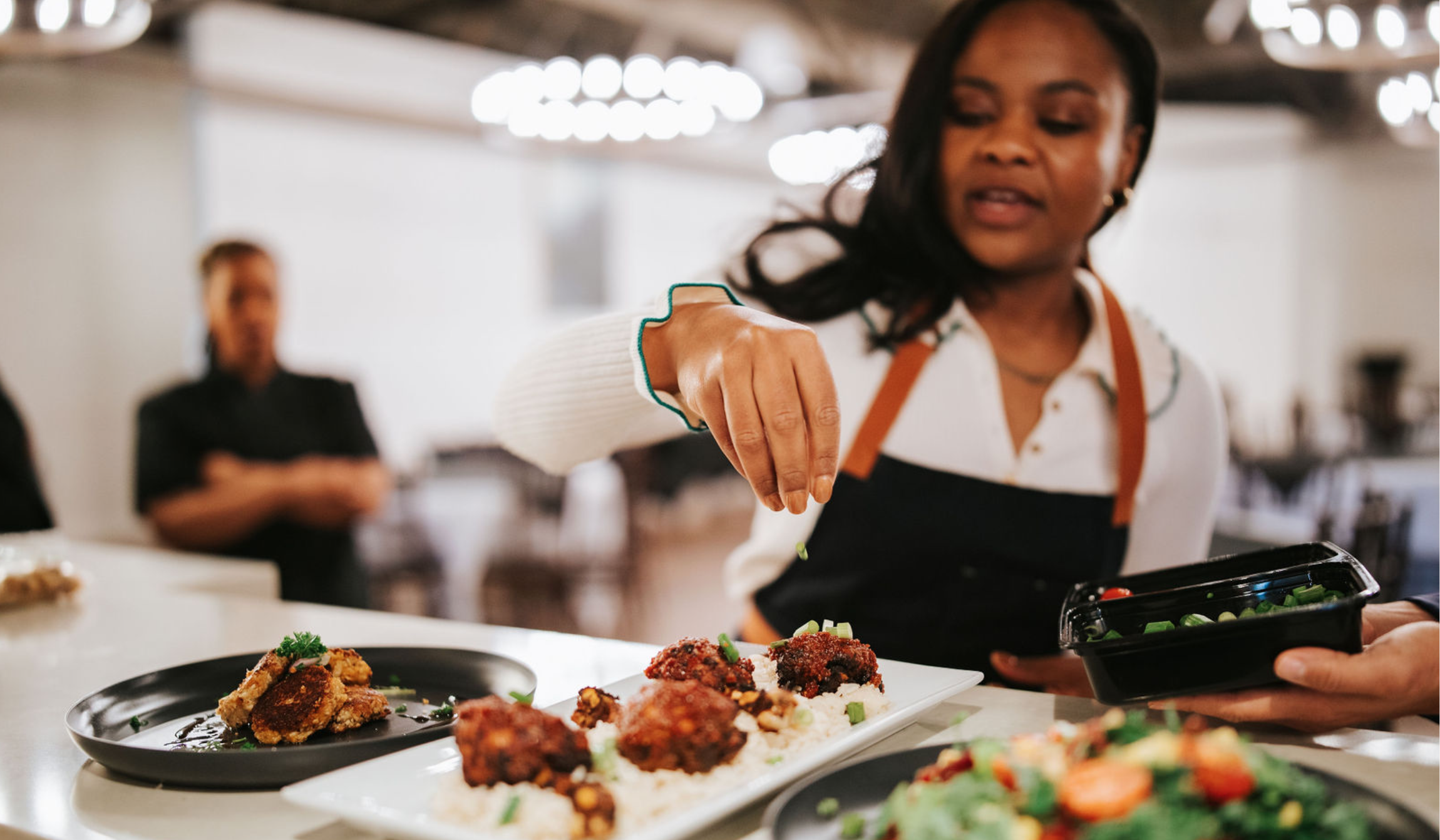Antoinette Johnson at work (All rights reserved to owner)
Antoinette Johnson is a Lexington-based chef, food journalist, and creative director, known for blending Southern culinary traditions with modern, budget-friendly home cooking. She rose to national attention as the winner of America’s Test Kitchen: The Next Generation, where she earned a $100,000 prize, a cookbook deal, and a spot on the cast. Her signature style—what she calls “halfway homemade”—is a reimagining of traditional comfort food, rooted in Black culinary history and designed to be accessible, soulful, and full of flavor. A champion of representation in food media, she uses her platform to challenge the systems that obscure Black culinary contributions and to remind her audiences that they’ve always belonged in every space.
You originally set your sights on a career in broadcast journalism while studying at the University of Kentucky. How did that early interest shape your storytelling today and what inspired the pivot toward food and culture?
AJ: I got my BA in Journalism, specifically the broadcast track, and when you go into Journalism, you can do print or you can do Broadcasting. And I went for the Broadcasting, which is interesting because in high school I wrote for my school newspaper since freshman year, so I was always in print. But I did a job shadow my senior year and realized that print wasn't necessarily for me; I wanted to kind of transition into Broadcasting.
I think what part of that influences my cultural storytelling now is I can remember my first journalism class. Going in, ready to write, thinking, “Okay, we're about to start exposing these stories and doing all this the first day,” and you don't even write in the first journalism class. You learn about the history of journalism, you learn about the laws, you learn about your role as a journalist in society, and I find that form of reporting and storytelling so important because it's rooted in facts, and it's rooted in history, and telling a story without any type of compromised agenda. That's kind of the lens that I use when it comes to how I tell my stories when it comes to Black food history.
How I kind of shifted specifically into food—it was just a hobby. I loved cooking, I love food. But my aunt one day sent me an Instagram post for an application to apply for America's Test Kitchen: The Next Generation, and she was like, “You need to apply for this.” I was like, “Okay, I'm gonna do it.” A day went by, I didn't do it. She texted me the next day, she's like, “Did you do this? Do it right now.” So I stopped what I was doing, I applied, and that really got me into the food space professionally.
Antoinette Johnson and the cast of America’s Test Kitchen. (Prime)
How did winning Season 1 of America’s Test Kitchen change the trajectory of your culinary journey?
AJ: Before, I was just a home cook. I posted my recipes on social media, and I got great responses, but I still felt very, kind of, more amateur in this space. Winning really solidified me and my skills. Personally, it made me feel more confident in myself to pursue it, but I think it also gave me access that I wouldn't have had from winning this show. Being able to meet people, being able to be put in front of so many eyes—it completely changed to where I'm not just a home chef anymore. I've cooked for over 200 people as a featured chef. I have a cookbook now. It made me realize that you can always pivot, you can always do something different in your life, and you're just one opportunity away from doing that.
Just another part of the story—when you go on a reality TV show, they do a lot of vetting. So you have background checks, you have to do a physical, you have to meet with a psychiatrist. I wouldn't call them tests, but questions—people wanted to make sure that we had cooking skills. It was a few days before we were supposed to leave, and the producer called me and she said, “Hey, just wanted to let you know we've decided to cast you as an alternate, so you'll fly out here, but you'll just stay in the hotel, and if something happens, you know, we can't really guarantee anything.” So I'm devastated, I'm crushed. I call my mom crying, like, “This was supposed to be my big break.” She really helped me talk through that and realize, “You still gotta keep going.”
So a few days before we were supposed to leave—I think it was 3 days before I was supposed to fly out—the producer calls me back and says, “Hey, just wanted to let you know, you've actually been recast. You're gonna be a cast member on the show, so make sure you have your 10 outfits and everything else.” I had to go get my hair braided that day. I was like, “Okay, great.” I got my hair braided, I started packing, getting all my clothes, and then I ended up winning. I think that things happening that way made me go into the competition with a completely different lens—being more grateful of just being there—and I think being able to really appreciate the experience, because I almost didn't get it.
“Before, I was just a home cook. I posted my recipes on social media, and I got great responses, but I still felt very, kind of, more amateur in this space.”
- Antoinette Johnson
A large part of your work is connecting food to culture. Highlighting black culinary traditions with personal narratives. How do you decide which narratives to tell, and what do you hope people walk away with after experiencing your work?
AJ: I love this question because when I am doing research, sometimes it can be information overload. Like, I'm so amazed by the things that I'm learning—I want to give y'all things in chronological order, I want to give you my opinion and what other people say. So it can be difficult. I always try to remember the lens in which I'm telling stories through. So the stories I tell are always gonna be rooted in history, and how it connects to today, and how those historical patterns—or things in history—repeat themselves in the patterns. I think we can learn so much about ourselves and society more when we reach back into the past and kind of analyze what happened.
So, I always like to make sure, “Okay, if I'm gonna tell a story, what's the history here, and how does it connect?” But also, I like to look at how are we—and this is just something I'm interested in—I love looking at how we as consumers act, because I think sometimes we don't really realize how we purchase things, how things are presented to us—we're heavily influenced. My professional background is in marketing and branding. I wrote copy for product packaging, so I understand how people's minds work and how you upsell.
I think that's something that I always want to focus on: “What about the decisions that we are making are not really our decisions? Let's talk about that so that we can then figure out, how are we influenced?” How can we then look at ourselves and the decisions that we make and make better decisions? So that's kind of the lens.
Antoinette Johnson releases her cookbook, “Mostly Homemade” (Prime)
What advice do you have for other content creators working to grow their audience, while staying grounded in their purpose? How have you personally balanced visibility with authenticity?
AJ: I would say, when it comes to purpose, you have to figure out what yours is and why you're here in this content creator space. Is your goal to make money? And if so, really dig deep into that. Make money like what? Because you can make, you know, you can get passive income. Or are you here to, you know, replace your job? Or are you here to have this fully fund your life? Or, if you're not here for money, are you here to promote a certain message? What is the message?
Because I've done both. First, content creation was more of a hobby for me, and then being able to kind of funnel in it working in more of a corporate space with digital marketing, social media marketing, and then getting to a point where I was able to leave my job and do content creation full-time. And now I'm in a space where, even though I was able to make money from content creation, I find that's great, that's awesome — you know, not having a boss, we love that. But I feel that when I depend on generating income from my content, I'm not able to create the content that I want.
It's interesting because I feel like the more authentic I am, the better my content is, but I'm sometimes a little bit afraid to show up as my fully authentic self. I think sometimes that happens to a lot of us, and you gotta figure out why. I think everybody's why is going to be different, but I think figuring out why — I think that's so important. Because if you're just trying to do what everybody else is doing, you're not going to be able to tap into people who can really connect with you.
Taking time to really understand who I am, and what is my purpose, getting more clarity on that — that really helps me be able to show up authentically. It's me.
What role does representation play in helping the next generation believe that their dreams and aspirations are truly possible?
AJ: I think representation is so important, and I think visualization is really important, and a lot of the times, when you don't see yourself, you feel like it's because you're not supposed to be there. And just knowing so much about Black history and the stories that I look and uncover, it's like—we were always there. Not only are you supposed to be here, but we've always been here, and I think that's where it's so important to know the history of whatever it is you want to do, whatever industry you want to be in, whatever is important to you, is look into it. You'll see that things that you think are impossible aren't. The story just might not be amplified.
I also think it's important to know the type of systems that we live in. It really fights against us. It doesn't want us to know certain things. It doesn't want us to progress, so it's important to understand how these systems that we operate in work, so that you can realize that's not true.
I kind of want to touch on imposter syndrome as well, because I do think sometimes we can think we're not supposed to be somewhere because we don't see ourselves—or even if we do see ourselves, or if we're in an environment that is heavily representative of what we look like—we still feel like we're not supposed to be there. And I just want people to know that that is not true. Like, anytime you have a negative thought about yourself, you have to say three things nice. Don't get into a loop feeling like you're not worthy and feeling like you're not supposed to be there, because that's not the truth. There’s so many things going against you, but you gotta push through it.
Want to hear more amazing stories like this? Check out our “More of Us” series! If you want to connect with Antoinette and support the work she is doing, follow her on social @antoinettegjohnson and get in touch with her by clicking here.



